Itraconazole Capsules 200 mg for Dogs: Comprehensive Guide to Indications, Dosage, and Safety
Fungal infections in dogs, while less common than bacterial or parasitic diseases, can be severe, chronic, and sometimes life-threatening. These infections often require long-term antifungal therapy, and effective treatment hinges on timely diagnosis, drug choice, and precise dosing. This comprehensive guide explores everything pet owners and veterinary professionals need to know about Itraconazole Capsules 200 mg —from indications and dosage to administration guidelines, safety considerations, and client compliance tips.
Understanding Itraconazole Capsules 200 mg : Composition and Pharmacology
Active Ingredient: Itraconazole (200 mg per tablet)
Drug Class: Triazole antifungal
Formulation: Oral tablet, film-coated
Mechanism of Action:
Itraconazole works as an antifungal by blocking lanosterol 14α-demethylase, an essential enzyme involved in producing ergosterol from lanosterol.Unlike many antifungal agents, itraconazole has a broad spectrum of action and is highly lipophilic, allowing for superior tissue penetration and prolonged antifungal activity.
Indications for Itraconazole Capsules 200 mg in Dogs
Itraconazole Capsules 200 mg, a high-dose itraconazole formulation, is primarily indicated for the treatment of moderate to severe systemic fungal infections in dogs. These infections, often caused by environmental or opportunistic fungi, can be life-threatening if left untreated. Itraconazole works by inhibiting the synthesis of ergosterol, a critical component of fungal cell membranes, leading to fungal cell death.
This powerful antifungal is particularly suited for medium to large dogs requiring precise dosing and long-term management of complex fungal conditions. Below are the primary clinical indications:
1. Blastomycosis
- Causative agent: Blastomyces dermatitidis
- Common sites: Lungs, skin, bones, eyes, lymph nodes
- Signs: Coughing, lameness, draining skin lesions, eye inflammation (uveitis), fever, anorexia
- Vetconazole role: First-line treatment for non-CNS blastomycosis; may be used alone or following amphotericin B
2. Histoplasmosis
- Causative agent: Histoplasma capsulatum
- The most frequently involved organs in systemic fungal infections include the lungs, GI tract, spleen, liver, and bone marrow.
- Signs: Chronic diarrhea, weight loss, coughing, anemia, enlarged lymph nodes
- Vetconazole role: Oral itraconazole is a drug of choice for systemic or GI histoplasmosis; long treatment duration required
3. Cryptococcosis (off-label use)
- Causative agent: Cryptococcus neoformans, gattii
- Common sites: Nasal cavity, CNS, skin, eyes
- Signs: Nasal discharge, facial swelling, neurologic signs, blindness
- Vetconazole role: May be used in non-CNS cryptococcal infections; more effective in localized nasal cases
4. Aspergillosis
- Causative agent: Aspergillus fumigatus (nasal) or terreus (systemic)
- Forms:
- Nasal aspergillosis (more common)
- Systemic/disseminated aspergillosis (especially in GSDs)
- Clinical signs include nasal discharge or bleeding, facial discomfort, and systemic symptoms in cases of dissemination.
- Vetconazole role: Used in localized nasal infections; less effective in disseminated cases, often combined with other antifungals
5. Sporotrichosis (rare in dogs)
- Causative agent: Sporothrix schenckii
- Signs: Nodular skin lesions, lymphatic spread, ulceration
- Vetconazole role: Alternative to ketoconazole; may be considered in resistant cutaneous infections
6. Dermatophytosis (Severe or Refractory Cases)
- Causative agents: Microsporum canis, Trichophyton mentagrophytes
- Signs: Circular alopecic lesions, crusting, scaling
- Vetconazole role: Reserved for generalized or resistant dermatophytosis when topical therapy fails
7. Candidiasis (off-label use)
- Causative agent: Candida albicans (typically secondary to immunosuppression)
- Sites: Oral cavity, GI tract, skin
- Vetconazole role: Used in disseminated candidiasis or mucocutaneous infections not responding to topical therapy
8. Prophylactic Antifungal Use (Investigational)
- In dogs undergoing:
- Chemotherapy
- Immunosuppressive therapy (e.g., for autoimmune disease)
- Organ transplants (experimental)
- Vetconazole role: May be explored as prophylaxis in high-risk patients—veterinarian discretion advised
Dosage and Administration Guidelines
Itraconazole Capsules 200 mg is prescription-only and should always be administered under veterinary supervision. The duration and frequency of treatment depend on the type and severity of the infection, the dog’s health status, and response to therapy.
Dosage: Vetconazole 200 mg for Dogs
| Dog’s Weight Range | Dosage Rate |
|
Tablet Quantity (200 mg) | Times per Day | ||
| 10–15 kg | 5 mg/kg | 50–75 mg | ¼ to ½ tablet | Once daily | ||
| 16–25 kg | 5 mg/kg | 80–125 mg | ½ to ⅔ tablet | Once daily | ||
| 36–50 kg | 5 mg/kg | 180–250 mg | 1–1¼ tablets | Once daily | ||
| 51–70 kg | 5 mg/kg | 255–350 mg | 1¼ to 1¾ tablets | Once daily |
Note: For large breed dogs requiring fractional tablets, scoring and exact dosing may be needed. Always follow veterinary direction.
Treatment Duration
| Condition | Average Treatment Duration |
| Blastomycosis | 60–180 days |
| Histoplasmosis | 90–180 days |
| Aspergillosis | 30–90 days |
| Sporotrichosis | 60–120 days |
| Dermatophytosis (systemic) | 30–60 days |
| Cryptococcosis | 60–180+ days |
| Candidiasis | 30–60 days |
Administration Tips
- Ensure consistency in dosing time (e.g., every 24 hours).
- Avoid giving with antacids or proton pump inhibitors, which reduce absorption.
- Do not crush or break the tablet unless instructed by a vet.
Safety Profile and Side Effects
Itraconazole Capsules 200 mg is generally well-tolerated when dosed appropriately, but itraconazole does carry risk of systemic side effects, especially with prolonged use or in animals with hepatic impairment.
Common Side Effects:
- Decreased appetite
- Vomiting or diarrhea
- Lethargy or depression
- Elevated liver enzymes (ALT, AST)
Less Common but Serious Effects:
- Hepatotoxicity
- Vasculitis (skin lesions, bruising)
- Drug-induced anorexia and weight loss
- Reproductive toxicity (avoid in pregnant dogs)
Monitoring During Therapy
Veterinarians typically recommend:
- Regular body weight tracking
- Observation for GI or behavioral changes
- Urinalysis and kidney function if used long-term
Drug Interactions
Vetconazole (itraconazole) is a potent inhibitor of cytochrome P450 enzymes, which can affect the metabolism of other medications.
Use With Caution If Also Taking:
- Corticosteroids (e.g., prednisone)
- Cyclosporine
- Macrolide antibiotics (e.g., erythromycin)
- Theophylline
- Anticoagulants (e.g., warfarin)
Consult your vet about adjusted dosages or alternative therapies if drug interactions are suspected.
Client Education and Compliance Tips
Key Talking Points for Pet Owners:
- Consistency is critical—never skip doses or stop early.
- Expect a long treatment period—some infections require 3 to 6 months of therapy.
- Be alert for adverse effects such as reduced appetite, nausea, or yellow discoloration of the gums (a sign of jaundice).
- Always report any unusual signs or behavior
- Do not co-administer with over-the-counter antacids without veterinary clearance.
Important Safety Information
- Use Vetconazole 200 mg only under the guidance of a licensed veterinarian.
- Not recommended for pregnant or lactating dogs due to teratogenic potential.
- Use caution in liver-compromised or geriatric dogs.
- Adverse reactions should be reported to your veterinarian and the manufacturer.
Research and Future Directions
As fungal infections in veterinary medicine become more recognized and accurately diagnosed, the role of systemic antifungal agents like Vetconazole 200 mg (itraconazole) continues to evolve. Ongoing research and clinical investigations are shaping the future of antifungal therapy in dogs by focusing on safety, efficacy, and resistance prevention.
1. Pharmacokinetic and Breed-Specific Studies
Recent studies are investigating the variability in itraconazole absorption and metabolism across different canine breeds and body sizes. Factors such as gastrointestinal pH, fat metabolism, and hepatic enzyme activity may influence how Vetconazole 200 mg is processed. This research could lead to:
- Breed-specific dosing recommendations
- Enhanced bioavailability strategies, such as nanoparticle formulations or new suspension forms
2. Antifungal Resistance Surveillance
While fungal resistance is more common in human medicine, emerging antifungal resistance in veterinary pathogens like Aspergillus spp. and Candida spp. is being studied. Surveillance programs are working to:
- Identify resistance genes and mutations in canine fungal isolates
- Evaluate cross-resistance between azoles (itraconazole, fluconazole, etc.)
- Support responsible antifungal use to minimize resistance development
3. Combination Antifungal Therapies
Researchers are exploring the use of combination therapies that include Vetconazole 200 mg with other antifungals (e.g., amphotericin B, terbinafine) to enhance outcomes in refractory or systemic fungal infections. Goals include:
- Shortening treatment duration
- Lowering individual drug doses to reduce toxicity
- Improving success rates in deep or CNS fungal infections
4. Novel Drug Delivery Systems
Current work in veterinary pharmacology is also targeting new delivery technologies to improve drug absorption and compliance. Innovations include:
- Sustained-release formulations
- Transdermal gels or injectable microspheres
- Palatable chewable forms for dogs averse to tablets
Such innovations could revolutionize long-term antifungal treatment and improve quality of life for both pets and owners.
5. Expanded Indications and Off-Label Use
Future clinical trials may expand the approved uses of Vetconazole 200 mg for additional indications such as:
- Prophylactic antifungal use in immunosuppressed dogs (e.g., chemotherapy patients)
- Localized fungal keratitis and otitis externa
- Fungal infections in exotic species (ferrets, rabbits) where itraconazole shows promise
6. Environmental and Zoonotic Considerations
Some systemic fungal infections like blastomycosis and histoplasmosis are environmental and may impact multiple species. Research is evaluating:
- Possible zoonotic implications of emerging mycoses
- Public health roles for veterinarians in identifying and mitigating fungal outbreaks
Conclusion
Itraconazole Capsules 200 mg offers a powerful and dependable solution for the treatment of serious fungal infections in dogs. With its broad-spectrum activity, excellent tissue penetration, and high itraconazole concentration, it is ideally suited for medium and large breed dogs requiring systemic antifungal therapy. Proper dosing, ongoing monitoring, and clear client communication are key to successful outcomes.Whether treating blastomycosis, histoplasmosis, or persistent dermatophytosis, Vetconazole 200 mg continues to play a vital role in modern veterinary antifungal protocols.Its active ingredient, itraconazole, offers broad-spectrum antifungal coverage, excellent tissue penetration, and a relatively favorable safety profile when administered under veterinary supervision.







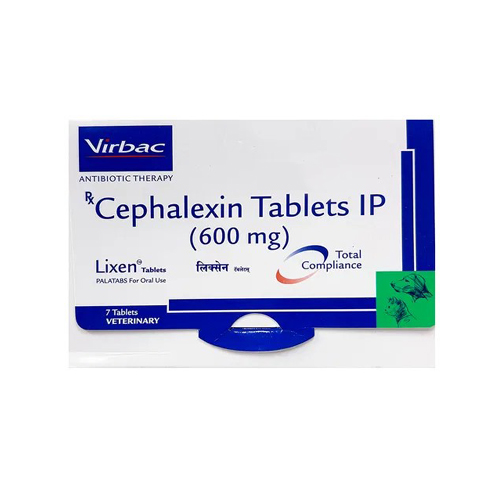
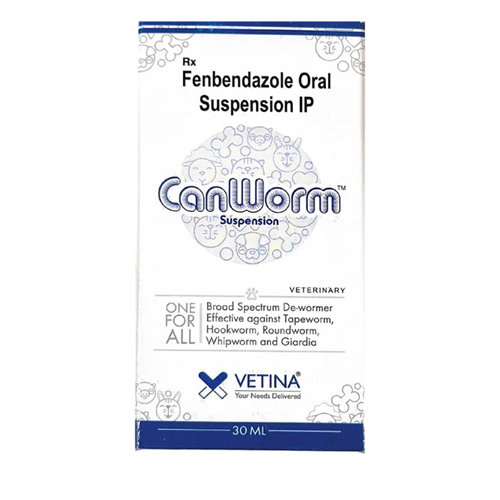


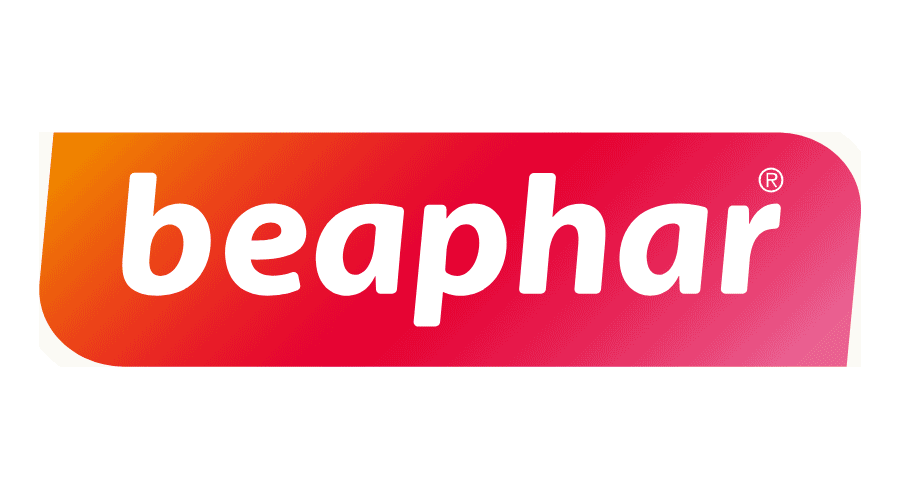
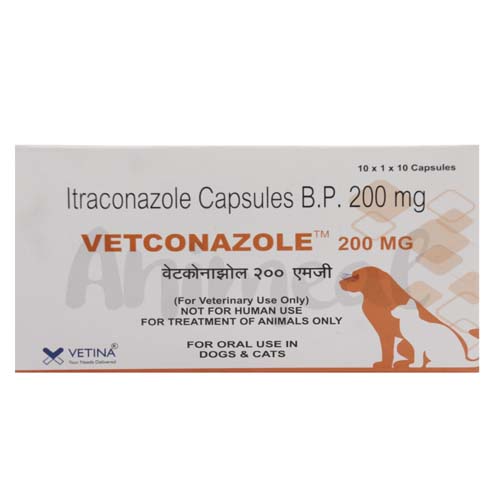
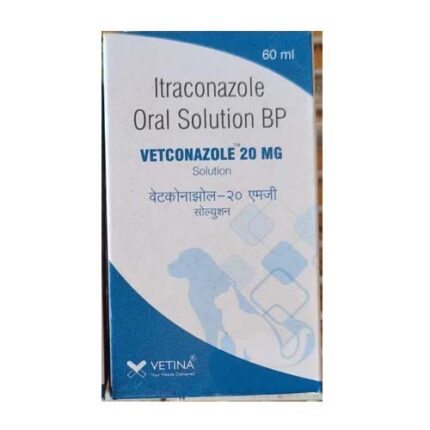
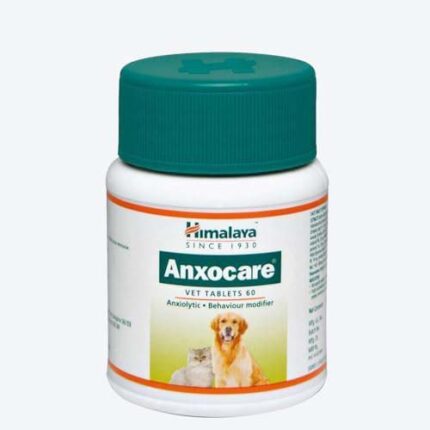
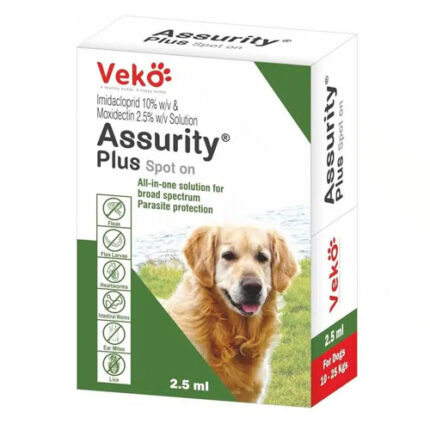
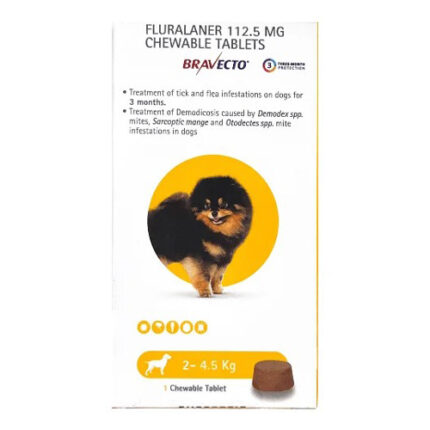
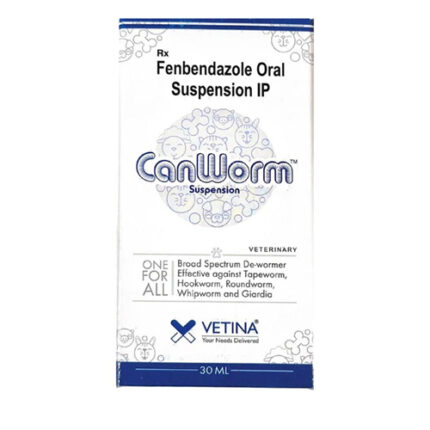
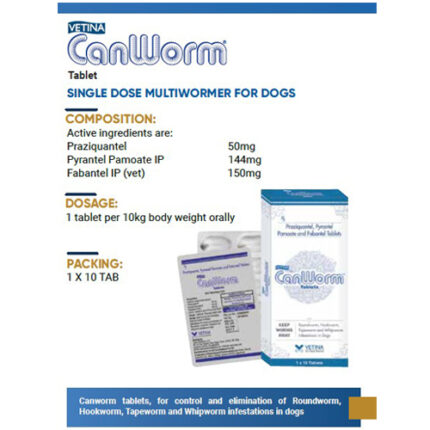

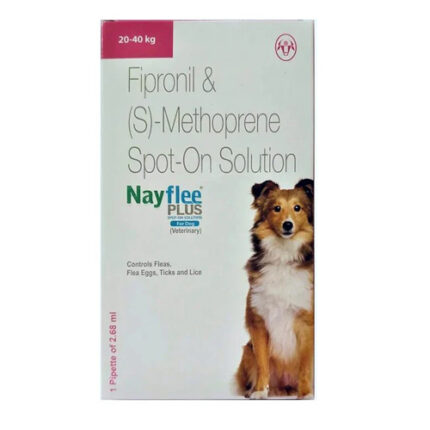
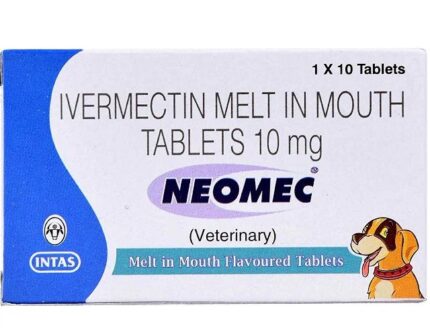
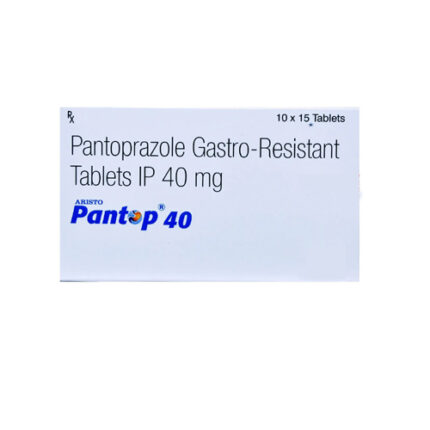
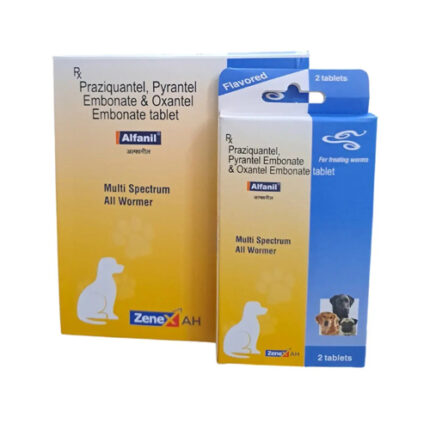
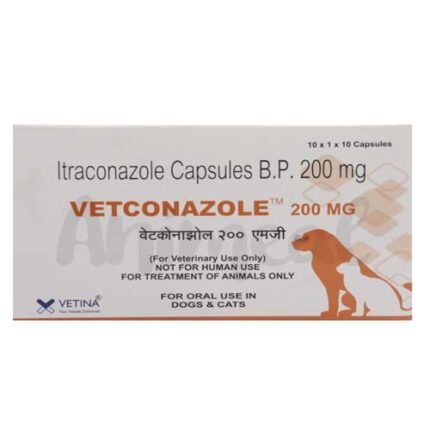
Reviews
There are no reviews yet.